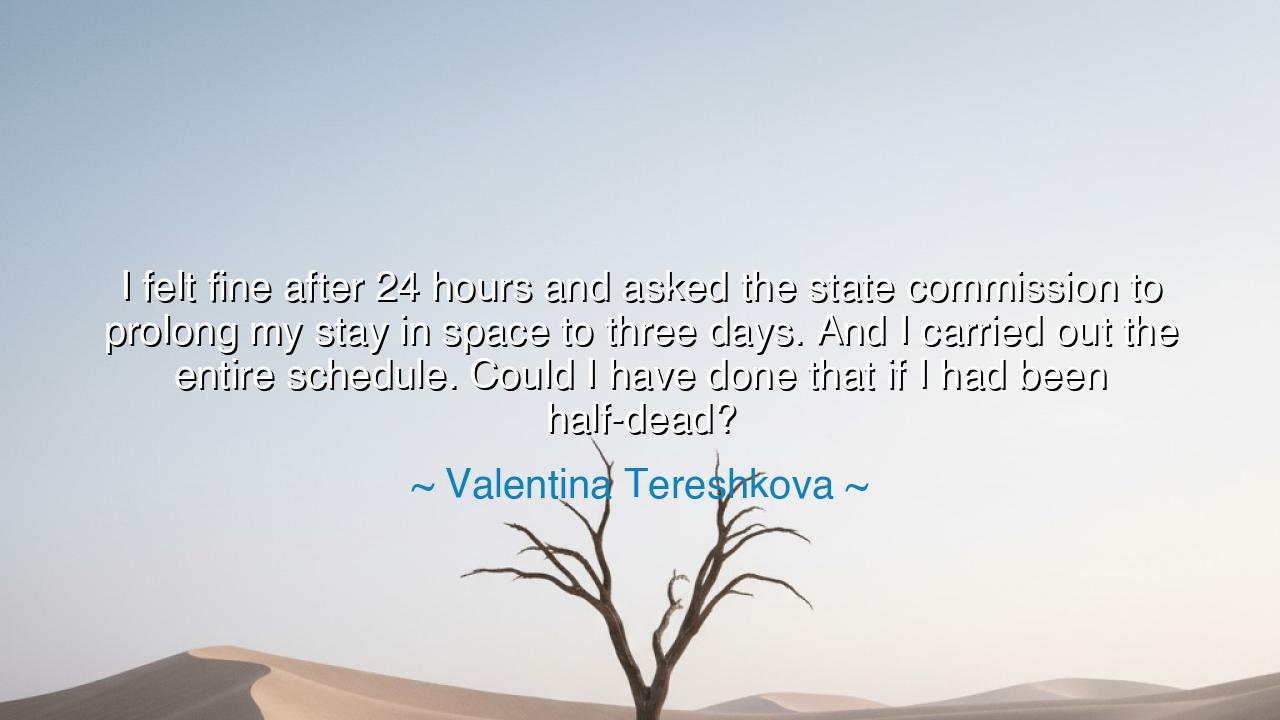
I felt fine after 24 hours and asked the state commission to
I felt fine after 24 hours and asked the state commission to prolong my stay in space to three days. And I carried out the entire schedule. Could I have done that if I had been half-dead?






Hear the triumphant voice of Valentina Tereshkova, the first woman to pierce the heavens, who declared with pride and defiance: “I felt fine after 24 hours and asked the state commission to prolong my stay in space to three days. And I carried out the entire schedule. Could I have done that if I had been half-dead?” These are not the words of complaint, but of vindication. They resound as a challenge to doubters, a proclamation that the strength of a woman is equal to the stars themselves, and that courage needs no apology.
The origin of this quote lies in her legendary flight of 1963, when Tereshkova became not only the first woman in space, but also the first civilian to orbit the earth. In a time when many questioned whether a woman’s body and spirit could endure the rigors of the cosmos, she rose above the world in her vessel, Vostok 6, and silenced the skeptics with deeds rather than words. Her mission lasted nearly three days, during which she orbited the earth forty-eight times, proving not only her own resilience but the capacity of all women to stand as pioneers in the fields once barred to them.
Her cry—“Could I have done that if I had been half-dead?”—is the voice of every pioneer confronted with doubt and dismissal. It is the eternal answer of those who have been told they are too weak, too fragile, too unworthy. Tereshkova’s words cut through the fog of prejudice, reminding us that human endurance is not confined to one gender, one class, or one nation. Her body, once dismissed as delicate, withstood the void of space; her spirit, once questioned, carried the weight of a nation’s pride.
History offers us other mirrors of her defiance. Think of Florence Nightingale, who in the Crimean War was told that women could not withstand the horrors of battlefields. Yet she pressed on, bringing light and healing where soldiers despaired, proving through sleepless nights and endless labor that she was far from “half-dead.” Or recall Harriet Tubman, who was told slavery was an unbreakable chain—yet she returned again and again to lead others to freedom, enduring storms, wounds, and fear, with a vitality greater than those who doubted her. Tereshkova belongs to this lineage of iron women whose actions shattered disbelief.
The meaning of her words is heroic: they teach us that strength is revealed not in excuses, but in performance; not in how others measure us, but in how we rise to meet impossible demands. To “carry out the entire schedule” is not merely to finish a task, but to prove to the world that the spirit of determination can silence every whisper of doubt. Tereshkova’s flight was not only a journey through the stars; it was a testament to resilience, to courage, to the breaking of barriers.
The lesson for us is clear: when faced with doubt, do not waste your breath in endless arguments. Prove yourself through endurance, through action, through the quiet triumph of fulfilling what others deemed impossible. Let your victories be your voice, your deeds your defense. And when others question your strength, answer as Tereshkova did—not with bitterness, but with the radiance of accomplishment.
Practical wisdom flows from this. Take on challenges that seem beyond you, for in striving you will discover reserves of strength unknown even to yourself. When your body or mind is weary, remember that endurance grows from purpose, and purpose is stronger than pain. Surround yourself not with those who say “you cannot,” but with those who ask “what more can you do?” And above all, carry your schedule with pride, for every completed task is a star in the constellation of your life.
Thus, Tereshkova’s words must echo across generations: “Could I have done that if I had been half-dead?” No, she was fully alive—alive with courage, alive with endurance, alive with the fire of one who proved the impossible. May all who hear her voice learn this truth: that strength is not in denying weakness, but in rising above it; not in silence before doubters, but in deeds that outshine every doubt, as stars outshine the night.






AAdministratorAdministrator
Welcome, honored guests. Please leave a comment, we will respond soon